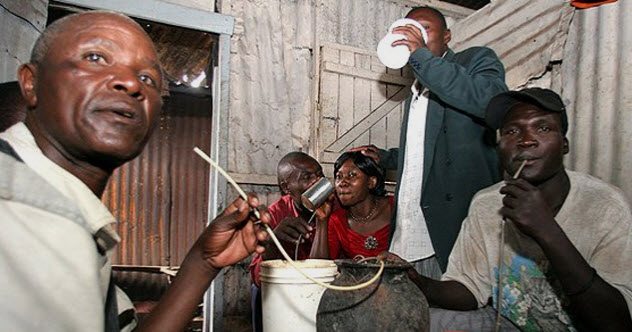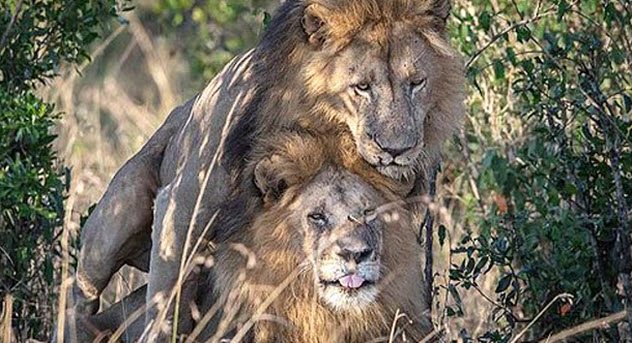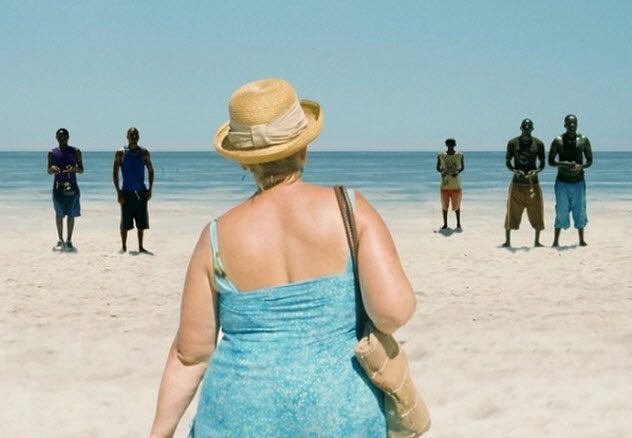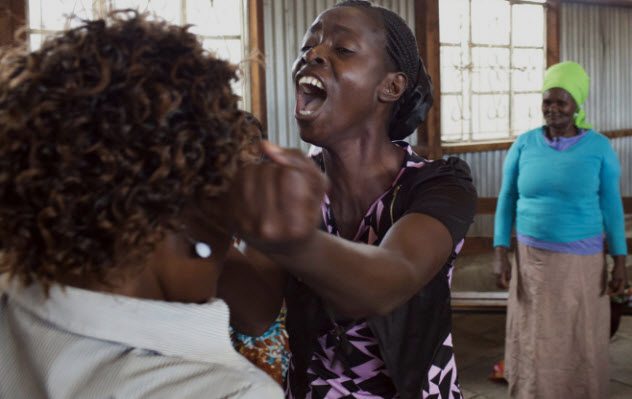Today, we take you to the wackier side of Kenya where the monkey terrorists reign supreme and the white women do unspeakable things. (But this is an Ash list, so you know we’re gonna speak about ’em.) Yeah, we’ll start you off with a factoid or two, but then we’ll get to the good stuff. So fasten your seat belts and get ready for the wildest safari you’ve ever been on. If it’s funny or in poor taste, we’ll be sure to cover it. We may even throw in some serious stuff. Enjoy!
10 Land Of Many Tongues
An amazing 67 languages are spoken in Kenya. (Some sources say 68 or 69, but let’s not quibble, folks.) While the country’s official languages are English and Swahili, the other major languages have evolved from those of tribal culture Africans. A minority group formed by the descendants of the foreign Arabic and Eastern settlers generally favor speaking Middle Eastern and Asian languages such as Arabic and Hindi. Three main language families dominated the region. People in central and southeastern Kenya speak the Bantu language while the Nilotic languages are common among the people of western Kenya. The third language group is Cushitic, which is common in the northeast.[1] So, depending on where you go in Kenya, you could end up trying to comprehend a truly staggering array of languages. While English will get you by, the smorgasbord of available tongues in Kenya can only be analogous to a particularly wild night at Hugh Hefner’s mansion sometime in 1978.
9 No Fridge, No Problem
Due primarily to a near total lack of electrical infrastructure outside of major cities during the country’s modernizing period, the Kenyans were introduced to a wild array of beverages without the accompanying technology to keep the new wave of terrible American beers cold. Perhaps the Kenyans have discovered some way to make Budweiser or Coors palatable at room temperature. Who knows? We do know that all your favorite drinks are available in Kenya, just at a cozy 25 degrees Celsius (77 °F) in the shade.[2] In a way, it’s an honest appraisal of the quality of American lager that this quasi–rat urine fluid is the same at any temperature. On the other hand, the possibility of consuming warm Czech pilsner is daunting. Let us not even contemplate how people handle champagne.
8 A Monkey Cut The Nation’s Power
Think we were kidding about the scant electrical grid in Kenya? Well, in 2016, a monkey fell off a roof onto a transformer. The resulting power outage lasted for four hours and completely darkened the nation. Kenya, which is the size of France with about two-thirds of the population density and far more uninhabited land, relies on five major stations by the Tana River to provide most of the power. A disruption to one station can cause major problems for distribution—as we saw in this case.[3] Despite electric fences, intrepid animals who may or may not be attempting to conquer humanity can and will turn off the lights for the whole nation. What agenda these possibly despotic primates have we may never know. Do they want to hold our XBox Live access hostage for bananas? Is this a declaration of simian war that we just cannot understand? Why won’t they tell us? In any case, this particular monkey terrorist survived and apparently escaped death by firing squad or prison. Liberals, eh?
7 Monkey Sex Terrorists Raid Villages
Some readers may consider the electrical apes to be a mere comedy, whimsy, or facile amusement crafted to entertain. Nothing could be further from the truth. In fact, monkey terrorism is a broad-ranging issue in Kenya. In 2007, up to 300 monkeys began raiding the village of Nachu in terrifying dawn raids. Not only were these chimpy chompers eating all the villagers’ food, it quickly became apparent that these monkeys were misogynists, too. “The monkeys grab their breasts and gesture at us while pointing at their private parts. We are afraid that they will sexually harass us,” said one villager.[4] Despite dressing up as men, the women of the village were unsuccessful in fooling the hairy transgressors, who simply threw stones and chased the women away. Monkey conflict is a fairly regular occurrence as a village afflicted by drought in 2000 found out. Whether this is down to environmental factors or some twisted, anthropoid form of neo-Nazi ideology we may never know. Kenyan monkeys are a violent scourge despite their cute, cuddly appearance.
6 An Alien Landscape
The Great Rift Valley splits Kenya in two and stretches from Lebanon to Mozambique. In the Kenyan part of the valley lies Lake Magadi. Jam-packed with natural bicarbonate of soda, the environment is strange to the eye. Only one kind of fish can survive in such salty conditions, but plants and algae conduct supercharged photosynthesis—making the lake itself energy rich. This, in turn, feeds shrimp, which attract flamingos by the thousands in the rainy season. From the journal of Robert Ripley, 1933: A light rain, which barely wets the surface, causes a tiny plant growth on the soda, giving it a pink color. A long heavy rain leaves water to a depth of a few inches, causing the lake to turn blue in color. But the heavy specific gravity of the water makes it still and smooth as glass, with never a ripple appearing on its even surface.[5] In ancient times, the valley was a gigantic freshwater lake. The current salty conditions have preserved many ancient and extinct species perfectly.
5 Breaking News: Lions ‘Learning To Be Gay From Tourists’
In some African nations, homosexuality is punishable by death. Although Kenya is not one of these, sodomy of any kind carries a 14-year-long stretch and helping a brother out with a swift one off the wrist could land you in the clink for half a decade. Naturally, the news that the king of the jungle is not averse to bum fun has come as quite a shock to some morally concerned folks in Kenya. Blaming possible possession by gay demons, Ezekial Mutua of the Kenya Film Classification Board has said, “These animals need counseling because probably they have been influenced by gays at the park. [ . . . ] They must have copied it somewhere, or it is demonic. Because these animals do not watch movies.”[6] Getting into the stride of his slightly worrying interest in how lions get it on, Mutua said: “Isolate the crazy gay animals. [ . . . ] Two male lions cannot procreate, and therefore, we will lose the lion species.” Listverse brings you this sad news with urgency and warns the public that humanity will come to an end shortly thanks to men who watch dancing reality TV shows and enjoy the music of Erasure. Prepare for your extinction, humans.
4 A Different Kind Of Bullfighting
In the common understanding of bullfighting, a Spaniard dressed like the head of the Kenya Film Classification Board’s dirtiest daydream attacks a cow with a sword. It’s really uncool, and no one should like it—except when the angry hamburger smashes some guy in the bum with a pointy horn. Then you can laugh. In Kenya, they do things a little differently. There, the Idakho and Isukha communities meet once a month for a real bullfight. Bull versus bull. Horn to horn.[7] The bulls are bred solely for battle, ramped up on potions, and guarded against potential interference from witches. Then the steers are let rip at each other, bets are made, beers are pounded, and a good time is had by all. It’s kind of like watching the NFL but without the political protests and weird rules.
3 Where The White Women At? Kenya, Apparently
For many in the so-called progressive West, a patriarchal system is in place under which men rule and women have no power. Despite the evidence for such a reality being as strong as that for Hitler living in Buenos Aires, the flip side is very real in Kenya. For many years now, rich mzungus (“white women”) have traveled to Kenya in search of “mandingo.” “It’s a social arrangement. I buy him a nice shirt, and we go out for dinner. For as long as he stays with me, he doesn’t pay for anything and I get what I want—a good time. How is that different from a man buying a young girl dinner?” says one woman.[8] If we are looking at equality between men and women, there is no problem with such consensual relationships. However, precautions should be taken, particularly in a nation with an HIV prevalence of about 6 percent of the population according to 2015 estimates. However, the rates vary dramatically by county—from a low of 0.4 percent of the population in Wajir in eastern Kenya to a high of 26.0 percent in Homa Bay in western Kenya.
2 Tech Crimes Are A New Epidemic
One might not expect hacking to be a particularly prevalent problem in a nation where your Internet can be shut down by a monkey. The issue has arisen from easily available hardware not being accompanied by quality software or support—leaving a gap in the market for tech-savvy thieves. Every year, around two billion Kenyan shillings (US$19.3 million) leave the economy through cybercrime—no mean pickings in a country with a GDP of approximately US$70.5 billion in 2016. “Cybercrime is now recognized as a threat to national security, key ICT infrastructure, and the enjoyment of constitutional human rights of Kenyans such as the right to privacy,” said Director of Public Prosecutions Keriako Tobiko.[9]
1 Taking Steps To Save Grandma From Rape
As a developing nation, the problems faced by Kenya extend to some truly tragic extremes. Through a lack of education, some people see rape as a weapon, a cure, or a purifying ritual. “Boys had crazy ideas that after a robbery, when they sleep with an old woman, it’s like they are cleansed,” said Sheila Kariuki, a former resident of Korogocho, one of the most dangerous slums in Kenya’s capital. In this slum, one in four women can expect to be a victim of rape.[10] With such a poor economy and limited resources, American Jake Sinclair and his wife began a self-defense program in 2007 to teach elderly ladies how to protect themselves from rape. With the crime being perpetrated in epidemic numbers, the old ladies feign madness, learn how to poke assailants in the eyes, whack them in the groin with a walking stick, or break their noses with the palm of a hand. While not a long-term solution to the problem, many old women have been saved through this project. Read More: Twitter Wordpress























